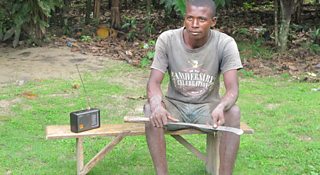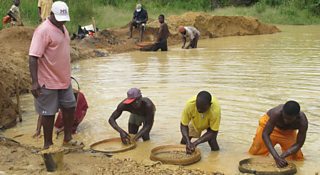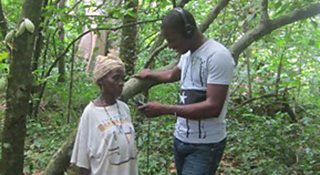"I will never abandon my cocoa farm"
Alpha Kamara
Content Researcher and Producer, ΒιΆΉΤΌΕΔ Media Action in Sierra Leone
Tagged with:
"I've never been interviewed on radio," 62-year-old Kumba Bintu Morsay excitedly told me as I turned on the microphone. "My cocoa-farming business has given me the opportunity - and now I feel very important in my community," she told me, smiling broadly.
I was interviewing Kumba for our two weekly radio programmes - Kakao Sese Kakoi (Cocoa News Bulletin) and Ngoyia Lende (Unity Boat) - which are broadcast in local languages Mende and Kono throughout eastern Sierra Leone to improve the skills and knowledge of the areaβs cocoa farmers.

Vital inheritance
It's more than a decade after the end of the civil war but farmers like Kumba still feel its effects. Her husband was killed in the war and she had to fight hard to keep the farm from being automatically passed on to his relatives.Β
Many women in Sierra Leone lose their homes after their husband dies β the law now forbids this β but change on the ground is slow. "I listened to the episode of Cocoa News Bulletin on farm inheritance," says Kumba, "and now know that the government has enacted the laws for women to own land and inherit their husbandβs property. I will not allow any relative or man to take advantage over me."
The income that she makes from her 20-acre farm now feeds her and her children, and enables them to buy clothing, repair their war-damaged house and even save a little money for emergencies.Β
Farming skills
Kumba says the cocoa radio programmes have also helped her in the day-to-day running of her farm. They provide her with information about cocoa pesticides, how to build effective cooperatives and, through interviews with farmers like herself, information about negotiating with cocoa buyers.

βWhen itβs planting season, the cocoa buyers come with loans that are like traps for us. If they lend you one hundred thousand Leones (USD 25) at planting time, they will take in exchange three times more in cocoa beans at harvest time. At the end of the day all our labour goes in vain,β she noted sadly.
Farming not mining
Cocoa farmers in Kono need all the support they can get, she says, because a lot of people in the village want to use the land for diamond mining rather than farming. "Farming is much more useful for the district, I think, as profits from diamond mining goes to foreign companies and local authorities rather than our community."

Diamond mining in eastern Sierra Leone.
Kumba was particularly keen to be interviewed on radio because she wanted the authorities to hear her view that diamonds canβt solve the districtβs problems but sustainable farming can.
So in the same programme as Kumbaβs pre-recorded interview, we put her points to a Ministry of Trade and Industry official, Lamin Gbogba.
He assured Kumba that supporting cash crop farmers is a priority area for the government and revealed that soon the Sierra Leonean government will work with community banks to provide loans to farmers. But Gbogba also noted that his government cannot shy away from mining as it brings foreign investment and exchange to the country and provides employment.

Speaking on our reporter's phone from her compound, Kumba responded that she was very happy that her concerns had been put to the authorities and was satisfied that her point had been noted. She also called on the programme to follow up the official's assurances.
Kumba told me she was grateful for the chance to get her voice heard. "I appreciate the cocoa programme so much because it makes me feel part of the radio," she added, before adding defiantly, "I will never abandon my cocoa farm."
Related links
Follow ΒιΆΉΤΌΕΔ Media Action on and
